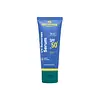What's inside
What's inside
 Key Ingredients
Key Ingredients

 Benefits
Benefits

 Concerns
Concerns

 Ingredients Side-by-side
Ingredients Side-by-side

Water
Skin ConditioningEthylhexyl Salicylate
UV AbsorberOctocrylene
UV AbsorberHomosalate
Skin ConditioningGlycerin
HumectantPropylene Glycol
HumectantNylon-12
Cyclopentasiloxane
EmollientBis-Ethylhexyloxyphenol Methoxyphenyl Triazine
Skin ConditioningGlyceryl Stearate
EmollientPolymethyl Methacrylate
Silica
AbrasivePhenoxyethanol
PreservativeCeteareth-20
CleansingCeteareth-12
EmulsifyingCetearyl Alcohol
EmollientCetyl Palmitate
EmollientSodium Laureth Sulfate
CleansingDimethicone/Vinyl Dimethicone Crosspolymer
Skin ConditioningAcrylates/C10-30 Alkyl Acrylate Crosspolymer
Emulsion StabilisingTriethanolamine
BufferingTriethylene Glycol
MaskingAminomethyl Propanol
BufferingHelianthus Annuus Seed Oil
EmollientPicea Mariana Bark Extract
AntioxidantEthyl Ferulate
AntioxidantRosmarinus Officinalis Leaf Extract
AntimicrobialTocopherol
AntioxidantEriophorum Spissum Flower/Stem Extract
Skin ConditioningWater, Ethylhexyl Salicylate, Octocrylene, Homosalate, Glycerin, Propylene Glycol, Nylon-12, Cyclopentasiloxane, Bis-Ethylhexyloxyphenol Methoxyphenyl Triazine, Glyceryl Stearate, Polymethyl Methacrylate, Silica, Phenoxyethanol, Ceteareth-20, Ceteareth-12, Cetearyl Alcohol, Cetyl Palmitate, Sodium Laureth Sulfate, Dimethicone/Vinyl Dimethicone Crosspolymer, Acrylates/C10-30 Alkyl Acrylate Crosspolymer, Triethanolamine, Triethylene Glycol, Aminomethyl Propanol, Helianthus Annuus Seed Oil, Picea Mariana Bark Extract, Ethyl Ferulate, Rosmarinus Officinalis Leaf Extract, Tocopherol, Eriophorum Spissum Flower/Stem Extract
Water
Skin ConditioningEthylhexyl Methoxycinnamate
UV AbsorberIsopropyl Myristate
EmollientButylene Glycol
HumectantNiacinamide
SmoothingMethylene Bis-Benzotriazolyl Tetramethylbutylphenol
UV FilterBis-Ethylhexyloxyphenol Methoxyphenyl Triazine
Skin ConditioningPhenylbenzimidazole Sulfonic Acid
UV AbsorberTriethanolamine
BufferingEthylhexyl Triazone
UV AbsorberPhenoxyethanol
PreservativePEG-100 Stearate
Glyceryl Stearate
EmollientDecyl Glucoside
CleansingNelumbo Nucifera Leaf Extract
Skin ConditioningCamellia Sinensis Leaf Extract
AntimicrobialAcrylates/C10-30 Alkyl Acrylate Crosspolymer
Emulsion StabilisingAllantoin
Skin ConditioningPsidium Guajava Fruit Extract
AstringentAngelica Gigas Extract
Skin ConditioningPanthenol
Skin ConditioningPropylene Glycol
HumectantChlorphenesin
AntimicrobialCentella Asiatica Extract
CleansingPentylene Glycol
Skin ConditioningTetrasodium EDTA
Sodium Hyaluronate
HumectantPolygonum Cuspidatum Root Extract
AntioxidantScutellaria Baicalensis Root Extract
AstringentMethyl Diisopropyl Propionamide
MaskingXanthan Gum
EmulsifyingGlycyrrhiza Glabra Root Extract
BleachingChamomilla Recutita Flower Extract
MaskingRosmarinus Officinalis Leaf Extract
AntimicrobialWater, Ethylhexyl Methoxycinnamate, Isopropyl Myristate, Butylene Glycol, Niacinamide, Methylene Bis-Benzotriazolyl Tetramethylbutylphenol, Bis-Ethylhexyloxyphenol Methoxyphenyl Triazine, Phenylbenzimidazole Sulfonic Acid, Triethanolamine, Ethylhexyl Triazone, Phenoxyethanol, PEG-100 Stearate, Glyceryl Stearate, Decyl Glucoside, Nelumbo Nucifera Leaf Extract, Camellia Sinensis Leaf Extract, Acrylates/C10-30 Alkyl Acrylate Crosspolymer, Allantoin, Psidium Guajava Fruit Extract, Angelica Gigas Extract, Panthenol, Propylene Glycol, Chlorphenesin, Centella Asiatica Extract, Pentylene Glycol, Tetrasodium EDTA, Sodium Hyaluronate, Polygonum Cuspidatum Root Extract, Scutellaria Baicalensis Root Extract, Methyl Diisopropyl Propionamide, Xanthan Gum, Glycyrrhiza Glabra Root Extract, Chamomilla Recutita Flower Extract, Rosmarinus Officinalis Leaf Extract
 Reviews
Reviews

Ingredients Explained
These ingredients are found in both products.
Ingredients higher up in an ingredient list are typically present in a larger amount.
Acrylates/C10-30 Alkyl Acrylate Crosspolymer is a synthetic polymer. It is used to thicken and improve the texture of products. Due to its properties, it can prevent water and oil ingredients from separating.
You might know this ingredient as Tinosorb S or Bemotrizinol. It is a UV filter that covers both UVA and UVB rays.
This ingredient has two peak UV absorption peaks ( 310 and 340 nm) and is able to absorb both UV-A and UV-B rays. This ingredient works by preventing UV rays from reaching and damaging your skin.
On top of that - it is highly photostable and helps prevent the photodegration of other sunscreen ingredients such as avobenzone.
Tinosorb S is allowed in the EU, Australia, and Asia. It is close to being approved by the FDA and we'll hopefully get this ingredient in the U.S. by late 2025.
Fun fact: Tinosorb S is the most effective UV absorber at maximum concentration (measured by SPF) permitted in the EU.
This ingredient is oil-soluble, so your oil-cleansers will take this right off at night.
Learn more about Bis-Ethylhexyloxyphenol Methoxyphenyl TriazineGlyceryl Stearate is a mix of glycerin and stearic acid.
It is used to stabilize the mixing of water and oil ingredients. By preventing these ingredients from separating, it can help elongate shelf life. It can also help thicken the product's texture.
As an emollient, it helps soften skin and supports barrier-replenishing ingredients.
In cosmetics, Glyceryl Stearate is often made from vegetable oils or synthetically produced.
This ingredient may not be fungal-acne safe
Fun fact: The human body also creates Glyceryl Stearate naturally.
Learn more about Glyceryl StearatePhenoxyethanol is a preservative that has germicide, antimicrobial, and aromatic properties. Studies show that phenoxyethanol can prevent microbial growth. By itself, it has a scent that is similar to that of a rose.
It's often used in formulations along with Caprylyl Glycol to preserve the shelf life of products.
Propylene Glycol is an odorless, colorless liquid. As a humectant, it helps skin retain moisture. It also aids in delivering active ingredients.
Another role of this ingredient is preventing a product from melting or freezing. Propylene glycol also adds antimicrobrial properties to a product, elongating product lifespan.
This ingredient is considered an organic alcohol and commonly added into both cosmetics and foods.
Those with sensitive skin or conditions may develop a rash when using this ingredient.
Learn more about Propylene GlycolRosmarinus Officinalis Leaf Extract comes from rosemary. Rosemary is native to the Mediterranean.
While Rosmarinus Officinalis Leaf Oil can be volatile due to its fragrant properties, the fragrance components are usually removed in the leaf extract.
Rosemary Leaf Extract contains many antioxidants such as rosmarinic acid and caffeic acid. Rosemarinic acid, a compound found in rosemary leaf, has been found to help soothe skin conditions such as eczema and acne.
Learn more about Rosmarinus Officinalis Leaf ExtractTriethanolamine is an emulsifier and pH adjuster. It is created using ethylene oxide and ammonia. This gives Triethanolamine a nitrogen core and a similar scent to ammonia.
As an emulsifier, it prevents ingredients from separating and enhances texture by adding volume to a product.
PH adjusters are common in cosmetic products. The pH of a product can affect the effectiveness of other ingredients. A product with a high pH may also irritate the skin.
Learn more about TriethanolamineWater. It's the most common cosmetic ingredient of all. You'll usually see it at the top of ingredient lists, meaning that it makes up the largest part of the product.
So why is it so popular? Water most often acts as a solvent - this means that it helps dissolve other ingredients into the formulation.
You'll also recognize water as that liquid we all need to stay alive. If you see this, drink a glass of water. Stay hydrated!
Learn more about Water